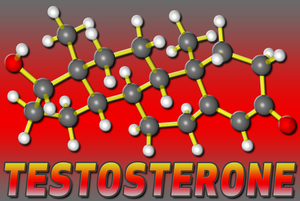Introduction
Depo Testosterone, a widely prescribed injectable form of testosterone produced by Pfizer, plays a crucial role in hormone replacement therapy for American males suffering from hypogonadism. While its benefits in improving symptoms such as low libido, fatigue, and muscle loss are well-documented, the impact of Depo Testosterone on the immune system remains a topic of significant interest and ongoing research. This article delves into the effects of Depo Testosterone on immune system function, providing valuable insights for American males considering or currently undergoing this treatment.
Understanding Depo Testosterone
Depo Testosterone, generically known as testosterone cypionate, is an ester of testosterone that is administered intramuscularly. It is designed to release testosterone slowly into the bloodstream, providing a steady level of the hormone over time. This formulation is particularly beneficial for patients requiring long-term testosterone supplementation. Pfizer's commitment to quality and efficacy has made Depo Testosterone a trusted choice among healthcare providers and patients alike.
Impact on Immune System Function
Testosterone, as a steroid hormone, has been shown to influence various aspects of immune system function. Research indicates that testosterone can modulate the activity of immune cells, including T cells and B cells, which are crucial for adaptive immunity. Studies have suggested that higher levels of testosterone may lead to a suppression of certain immune responses, potentially increasing susceptibility to infections.
A study published in the *Journal of Clinical Endocrinology & Metabolism* found that testosterone therapy, including Depo Testosterone, could alter the balance of pro-inflammatory and anti-inflammatory cytokines. This shift might affect the body's ability to respond to pathogens effectively. However, the exact mechanisms and long-term implications of these changes are still under investigation.
Clinical Observations and Patient Experiences
Clinically, some American males on Depo Testosterone have reported a perceived increase in susceptibility to common infections, such as colds and flu. While anecdotal, these reports align with the theoretical impact of testosterone on immune function. Healthcare providers often monitor patients closely for signs of infection and may adjust treatment plans accordingly.
It is important to note that the immune system's response to testosterone can vary widely among individuals. Factors such as age, overall health, and concurrent medications can influence how Depo Testosterone affects immune function. Therefore, personalized medical advice and regular follow-ups are essential for patients on this therapy.
Balancing Benefits and Risks
While the potential impact on the immune system is a consideration, the benefits of Depo Testosterone for many American males cannot be understated. Improved energy levels, mood, and physical strength can significantly enhance quality of life. For patients with hypogonadism, the advantages of testosterone replacement often outweigh the risks.
Healthcare providers typically weigh these factors carefully, ensuring that patients are well-informed about the potential effects on their immune system. Regular monitoring of testosterone levels and immune markers can help manage any adverse effects and optimize treatment outcomes.
Future Research Directions
Ongoing research continues to explore the complex relationship between testosterone and the immune system. Future studies may provide more definitive answers regarding the long-term effects of Depo Testosterone on immune function. Additionally, advancements in personalized medicine could lead to tailored treatment plans that minimize immune-related risks while maximizing therapeutic benefits.
Conclusion
Depo Testosterone by Pfizer remains a vital tool in managing hypogonadism in American males. While its impact on the immune system is an area of active research, the current understanding suggests a potential for altered immune responses. Patients and healthcare providers must work together to monitor and manage these effects, ensuring that the benefits of testosterone therapy are realized without compromising overall health. As research progresses, the medical community will continue to refine its approach to testosterone replacement, striving for the best possible outcomes for patients.
Contact Us Today For A Free Consultation

- Depo Testosterone: Enhancing Sexual Health in American Men with Low Testosterone [Last Updated On: March 17th, 2025] [Originally Added On: March 17th, 2025]
- Depo Testosterone: Impacts on Weight Management in American Males with Low Testosterone [Last Updated On: March 17th, 2025] [Originally Added On: March 17th, 2025]
- Depo Testosterone: Psychological Impacts on Mood, Cognition, and Self-Esteem in Men [Last Updated On: March 19th, 2025] [Originally Added On: March 19th, 2025]
- Depo Testosterone: Enhancing American Men's Health and Vitality [Last Updated On: March 19th, 2025] [Originally Added On: March 19th, 2025]
- American Men's Experiences with Depo Testosterone Therapy: Benefits and Challenges [Last Updated On: March 20th, 2025] [Originally Added On: March 20th, 2025]
- Depo Testosterone: Enhancing Energy and Vitality in Men with Hypogonadism [Last Updated On: March 20th, 2025] [Originally Added On: March 20th, 2025]
- Depo Testosterone: Enhancing Athletic Performance and Associated Risks in American Male Athletes [Last Updated On: March 21st, 2025] [Originally Added On: March 21st, 2025]
- Depo Testosterone: Enhancing Life for American Males with Hypogonadism [Last Updated On: March 21st, 2025] [Originally Added On: March 21st, 2025]
- Depo Testosterone: Impacts on Prostate Health and Cancer Risk in American Men [Last Updated On: March 21st, 2025] [Originally Added On: March 21st, 2025]
- Depo Testosterone: Benefits, Risks, and Management for Low Testosterone Treatment [Last Updated On: March 22nd, 2025] [Originally Added On: March 22nd, 2025]
- Depo Testosterone: Vital for Men's Health, Challenges in Accessibility and Solutions [Last Updated On: March 22nd, 2025] [Originally Added On: March 22nd, 2025]
- Depo Testosterone: Efficacy and Safety in American Males with Hypogonadism [Last Updated On: March 22nd, 2025] [Originally Added On: March 22nd, 2025]
- Navigating Insurance Coverage for Depo Testosterone: A Guide for American Men [Last Updated On: March 22nd, 2025] [Originally Added On: March 22nd, 2025]
- Depo Testosterone: Benefits and Considerations for Transgender American Males' HRT [Last Updated On: March 22nd, 2025] [Originally Added On: March 22nd, 2025]
- Depo Testosterone: Treating Delayed Puberty in American Males Effectively [Last Updated On: March 22nd, 2025] [Originally Added On: March 22nd, 2025]
- Depo Testosterone: Benefits and Skin Health Effects in American Men [Last Updated On: March 22nd, 2025] [Originally Added On: March 22nd, 2025]
- Depo Testosterone Therapy: Future Trends and Impact on American Male Health [Last Updated On: March 23rd, 2025] [Originally Added On: March 23rd, 2025]
- Depo Testosterone: Enhancing Libido and Sexual Function in American Men with Hypogonadism [Last Updated On: March 23rd, 2025] [Originally Added On: March 23rd, 2025]
- Depo Testosterone: A Promising Treatment for ED in American Men with Low Testosterone [Last Updated On: March 23rd, 2025] [Originally Added On: March 23rd, 2025]
- Depo Testosterone: Effects on Blood Sugar Levels in American Males [Last Updated On: March 24th, 2025] [Originally Added On: March 24th, 2025]
- Depo Testosterone: Benefits vs. Cardiovascular Risks for American Men [Last Updated On: March 24th, 2025] [Originally Added On: March 24th, 2025]
- Depo Testosterone: Monitoring, Dosage Adjustment, and Safety for American Males [Last Updated On: March 24th, 2025] [Originally Added On: March 24th, 2025]
- Depo-Testosterone's Impact on Sleep Quality in American Men: Insights and Management [Last Updated On: March 24th, 2025] [Originally Added On: March 24th, 2025]
- Depo Testosterone: Benefits and Risks for Older American Men's Health [Last Updated On: March 24th, 2025] [Originally Added On: March 24th, 2025]
- Depo Testosterone: Enhancing Life for American Male Cancer Survivors [Last Updated On: March 24th, 2025] [Originally Added On: March 24th, 2025]
- Depo Testosterone: Managing Chronic Conditions in American Men [Last Updated On: March 24th, 2025] [Originally Added On: March 24th, 2025]
- Depo Testosterone: Enhancing American Male Body Composition and Health [Last Updated On: March 24th, 2025] [Originally Added On: March 24th, 2025]
- Depo Testosterone: Enhancing Stress Management in American Males with Low Testosterone [Last Updated On: March 24th, 2025] [Originally Added On: March 24th, 2025]
- Depo Testosterone: Vital Therapy for Hypogonadism in American Male Adolescents [Last Updated On: March 25th, 2025] [Originally Added On: March 25th, 2025]
- Depo Testosterone: Enhancing Life Quality in American Male Veterans [Last Updated On: March 25th, 2025] [Originally Added On: March 25th, 2025]
- Depo Testosterone: Enhancing Endurance in American Male Athletes - Benefits and Risks [Last Updated On: March 25th, 2025] [Originally Added On: March 25th, 2025]
- Depo Testosterone and Hair Loss: Risks, Management, and Psychological Impact [Last Updated On: March 25th, 2025] [Originally Added On: March 25th, 2025]
- Depo Testosterone Pfizer: Enhancing Mood and Well-being in American Males with Hypogonadism [Last Updated On: March 25th, 2025] [Originally Added On: March 25th, 2025]
- Depo Testosterone's Impact on Digestive Health in American Males: Effects and Considerations [Last Updated On: March 25th, 2025] [Originally Added On: March 25th, 2025]
- Depo Testosterone: Enhancing Cognitive Function in American Males with TRT [Last Updated On: March 26th, 2025] [Originally Added On: March 26th, 2025]
- Depo Testosterone: A Promising Adjunct in Diabetes Management for American Males [Last Updated On: March 26th, 2025] [Originally Added On: March 26th, 2025]
- Depo Testosterone: Balancing Hormone Therapy and Fertility in American Males [Last Updated On: March 27th, 2025] [Originally Added On: March 27th, 2025]
- Depo Testosterone: Benefits for Hypogonadism and Potential Eye Health Risks in American Males [Last Updated On: March 27th, 2025] [Originally Added On: March 27th, 2025]
- Depo Testosterone: Enhancing Life Quality for American Males with HIV/AIDS [Last Updated On: March 27th, 2025] [Originally Added On: March 27th, 2025]
- Depo Testosterone: Benefits, Liver Risks, and Monitoring for American Men [Last Updated On: March 27th, 2025] [Originally Added On: March 27th, 2025]
- Depo Testosterone's Impact on Joint Health in American Males: Risks and Benefits [Last Updated On: March 27th, 2025] [Originally Added On: March 27th, 2025]
- Depo Testosterone: Enhancing Fertility in American Males with Low Testosterone [Last Updated On: March 27th, 2025] [Originally Added On: March 27th, 2025]
- Depo Testosterone: Pfizer's Injectable HRT for American Males with Low Testosterone [Last Updated On: March 27th, 2025] [Originally Added On: March 27th, 2025]
- Depo Testosterone: Benefits and Risks for American Male Weightlifters [Last Updated On: March 27th, 2025] [Originally Added On: March 27th, 2025]
- Depo Testosterone: Treating Anemia in American Men with Pfizer's Injectable Solution [Last Updated On: March 28th, 2025] [Originally Added On: March 28th, 2025]
- Depo Testosterone: Effects on Kidney Function and Monitoring in American Males [Last Updated On: March 28th, 2025] [Originally Added On: March 28th, 2025]
- Depo Testosterone: Treating Chronic Fatigue Syndrome in American Males [Last Updated On: March 28th, 2025] [Originally Added On: March 28th, 2025]
- Depo Testosterone's Role in Managing Osteoporosis in American Males: A Comprehensive Overview [Last Updated On: March 28th, 2025] [Originally Added On: March 28th, 2025]
- Depo Testosterone's Impact on Respiratory Health in American Males: A Comprehensive Review [Last Updated On: March 29th, 2025] [Originally Added On: March 29th, 2025]
- Depo Testosterone: A Promising Treatment for Depression in American Males with Low Testosterone [Last Updated On: March 29th, 2025] [Originally Added On: March 29th, 2025]
- Depo Testosterone's Impact on Ear Health in American Males: A Comprehensive Review [Last Updated On: April 2nd, 2025] [Originally Added On: April 2nd, 2025]
- Depo Testosterone: A Potential Treatment for Anxiety in American Males with Low Testosterone [Last Updated On: April 2nd, 2025] [Originally Added On: April 2nd, 2025]
- Depo Testosterone's Impact on Dental Health in American Males: A Comprehensive Analysis [Last Updated On: April 2nd, 2025] [Originally Added On: April 2nd, 2025]
- Depo Testosterone: Managing Thyroid Disorders in American Males [Last Updated On: April 3rd, 2025] [Originally Added On: April 3rd, 2025]
- Depo Testosterone: Managing Autoimmune Diseases in American Males [Last Updated On: April 7th, 2025] [Originally Added On: April 7th, 2025]
- Depo Testosterone: A Promising Solution for Migraine Management in American Males [Last Updated On: April 7th, 2025] [Originally Added On: April 7th, 2025]
- Depo Testosterone's Impact on Skin Health in American Males: Benefits and Side Effects [Last Updated On: April 8th, 2025] [Originally Added On: April 8th, 2025]
- Depo Testosterone: Uses, Allergic Reactions, and Management for American Males [Last Updated On: April 8th, 2025] [Originally Added On: April 8th, 2025]
- Depo Testosterone: A Promising Treatment for Insomnia in American Males [Last Updated On: April 8th, 2025] [Originally Added On: April 8th, 2025]
- Depo Testosterone: A Promising Option for Chronic Pain Management in American Males [Last Updated On: April 9th, 2025] [Originally Added On: April 9th, 2025]
- Depo Testosterone: Benefits for Neurological Disorders in American Males [Last Updated On: April 9th, 2025] [Originally Added On: April 9th, 2025]
- Depo Testosterone: Impacts on Cardiovascular Health in American Males [Last Updated On: April 10th, 2025] [Originally Added On: April 10th, 2025]
- Depo Testosterone's Impact on Gastrointestinal Health in American Males [Last Updated On: April 10th, 2025] [Originally Added On: April 10th, 2025]
- Depo Testosterone: Understanding TRT for Hypogonadism in American Males [Last Updated On: April 10th, 2025] [Originally Added On: April 10th, 2025]
- Depo Testosterone: Enhancing Respiratory Health in Hypogonadal American Males [Last Updated On: April 11th, 2025] [Originally Added On: April 11th, 2025]
- Depo Testosterone: Enhancing Arthritis Management in American Males [Last Updated On: April 13th, 2025] [Originally Added On: April 13th, 2025]
- Depo Testosterone: Effects, Risks, and Management in Male Reproductive Health [Last Updated On: April 15th, 2025] [Originally Added On: April 15th, 2025]
- Depo Testosterone's Impact on Psychiatric Disorders in American Males: A Comprehensive Review [Last Updated On: April 16th, 2025] [Originally Added On: April 16th, 2025]
- Depo Testosterone: Benefits and Considerations for American Males with Genetic Disorders [Last Updated On: April 17th, 2025] [Originally Added On: April 17th, 2025]
- Depo Testosterone: Managing Musculoskeletal Disorders in American Males [Last Updated On: April 17th, 2025] [Originally Added On: April 17th, 2025]
- Depo Testosterone: Potential Dermatological Uses and Considerations in American Males [Last Updated On: April 18th, 2025] [Originally Added On: April 18th, 2025]
- Depo Testosterone: Enhancing Metabolic Health in American Males with Pfizer's Therapy [Last Updated On: April 18th, 2025] [Originally Added On: April 18th, 2025]
- Depo Testosterone: Enhancing Life for American Males with Renal Disorders [Last Updated On: April 18th, 2025] [Originally Added On: April 18th, 2025]
- Depo-Testosterone's Impact on Urological Disorders in American Males: Benefits and Risks [Last Updated On: April 18th, 2025] [Originally Added On: April 18th, 2025]
- Depo Testosterone: A Promising Treatment for Inflammatory Diseases in American Males [Last Updated On: April 18th, 2025] [Originally Added On: April 18th, 2025]
- Depo Testosterone's Impact on Hematological Disorders in American Males: Risks and Management [Last Updated On: April 20th, 2025] [Originally Added On: April 20th, 2025]
Word Count: 608





















